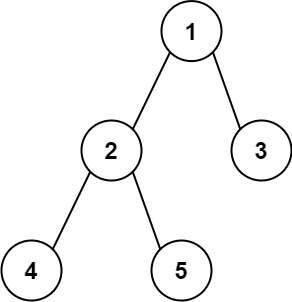LeetCode-in-All
543. Diameter of Binary Tree
Easy
Given the root of a binary tree, return the length of the diameter of the tree.
The diameter of a binary tree is the length of the longest path between any two nodes in a tree. This path may or may not pass through the root.
The length of a path between two nodes is represented by the number of edges between them.
Example 1:

Input: root = [1,2,3,4,5]
Output: 3
Explanation: 3 is the length of the path [4,2,1,3] or [5,2,1,3].
Example 2:
Input: root = [1,2]
Output: 1
Constraints:
- The number of nodes in the tree is in the range
[1, 104]. -100 <= Node.val <= 100
Solution
/**
* Definition for a binary tree node.
* struct TreeNode {
* int val;
* TreeNode *left;
* TreeNode *right;
* TreeNode() : val(0), left(nullptr), right(nullptr) {}
* TreeNode(int x) : val(x), left(nullptr), right(nullptr) {}
* TreeNode(int x, TreeNode *left, TreeNode *right) : val(x), left(left), right(right) {}
* };
*/
class Solution {
private:
int diameter;
public:
int diameterOfBinaryTree(TreeNode* root) {
diameter = 0;
diameterOfBinaryTreeUtil(root);
return diameter;
}
private:
int diameterOfBinaryTreeUtil(TreeNode* root) {
if (root == nullptr) {
return 0;
}
int leftLength = root->left != nullptr ? 1 + diameterOfBinaryTreeUtil(root->left) : 0;
int rightLength = root->right != nullptr ? 1 + diameterOfBinaryTreeUtil(root->right) : 0;
diameter = max(diameter, leftLength + rightLength);
return max(leftLength, rightLength);
}
};

